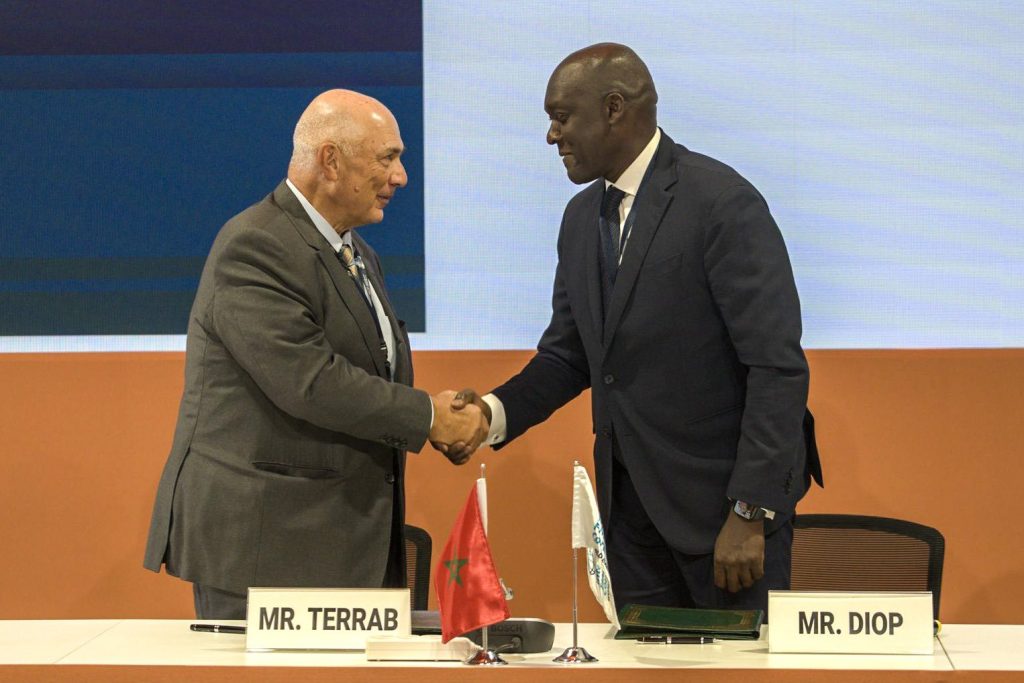At the Annual Meetings of the International Monetary Fund (IMF) and the World Bank, which are taking place in Marrakech, Morocco, the International Finance Corporation (IFC) announced a commitment of $200 million to the Kingdom of Morocco. Of this funding, $100 million represents a loan to Office Chérifien des Phosphates (OCP).
https://twitter.com/IFCAfrica/status/1711728208259756158?ref_src=twsrc%5Etfw%7Ctwcamp%5Etweetembed%7Ctwterm%5E1711728208259756158%7Ctwgr%5E2883c7f6cef27888aca58ad8ab7074a66ee29292%7Ctwcon%5Es1_&ref_url=https%3A%2F%2Fwww.afrik21.africa%2Fassemblees-fmi-bm-200-m-pour-lecoconstruction-et-lagriculture-durable-au-maroc%2F
This producer of phosphate-based fertilisers will use this funding to implement “its ambitious solar programme and the greening of global food systems”, according to the IFC, the World Bank Group’s private sector financing arm. The first phase of the OCP Group’s solar programme, which already received a €100 million loan from the IFC in April 2023, involves the construction of four solar photovoltaic power plants with a combined capacity of 202 MWp near the mining towns of Benguérir and Khouribga.
Sustainable fertiliser production
In the second phase of its programme, OCP Group will build two large solar photovoltaic power plants. The largest will be built in two stages on a 1,000-hectare site in Benguerir. The first stage will have a capacity of 30 MWp, followed by a second stage of 271 MWp, with a 100 MWh battery electricity storage system. The other solar power plant, with a capacity of 99 MWp, will be built in Khouribga. The cost of these two plants is estimated at $380 million.
Read also- MOROCCO: after the earthquake, $1.3 billion from the IMF to build resilient, green cities
One of the beneficiaries of the financing announced on 10 October 2023 by the IFC is the Moroccan cement manufacturer Ciments de l’Afrique (CIMAF), which has been granted a $45 million loan “to support the production of low-carbon cement in Africa”, according to the World Bank subsidiary. The funding will support the ambition of Omnium des Industries et de la Promotion (OPI), CIMAF’s parent company, to achieve carbon neutrality by 2050.
Low-carbon cement production
As part of this strategy, CIMAF’s Bobo Dioulasso plant in Burkina Faso will start producing calcined clay as an alternative to clinker, the main component of cement. In the capital Ouagadougou, the Moroccan company will equip its cement plant with a 5 MWp photovoltaic solar power plant. In N’Djamena, Chad, the Cimaf plant will soon be powered by a 4 MWp solar plant. A 7 MW solar farm is also planned to power its Dio Gare cement plant in the Kati district of Mali.
In Marrakech, the IFC also announced the establishment of a $36 million risk-sharing mechanism with the Banque Centrale Populaire (BCP) and the Compagnie Marocaine de goutte-à-goutte et de pompage (CMGP), which produces and distributes irrigation systems, to support sustainable agriculture in Morocco, “including in the region affected by the earthquake”, adds the IFC. At the same time, the investment company headed by Senegalese Makhtar Diop is taking a €10 million stake, in partnership with Mediterrania Capital, in Moroccan financial services provider Cash Plus to promote financial inclusion in the Kingdom of Morocco.
Jean Marie Takouleu
